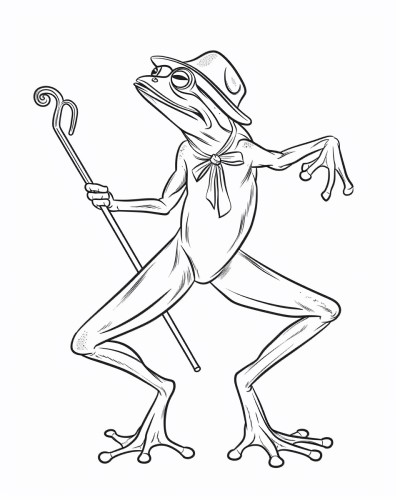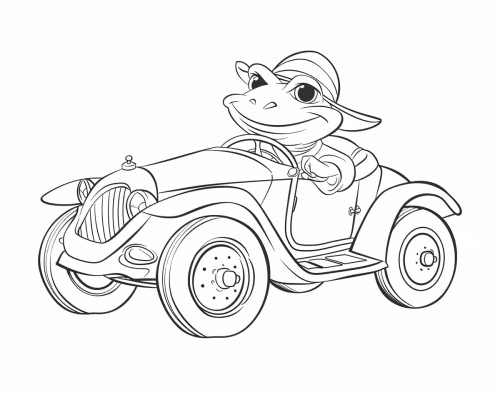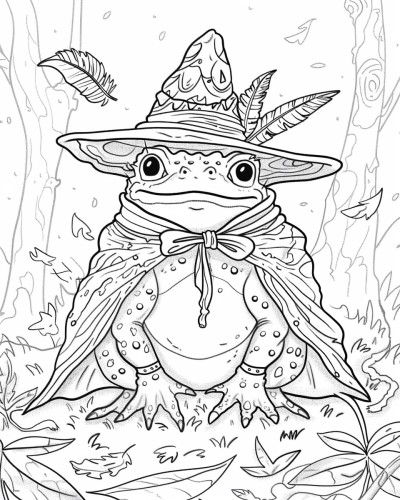Frogs >
Leanne's Printable Coloring Pages for Kids
Coloring Pages of Frogs and Toads from Famous Stories, Myths and Legends
Frogs and toads leap from the pages of famous myths, stories, songs, and legends, embodying magic, transformation, and wisdom, from the enchanted kiss in "The Frog Prince" to the clever escapades of the frumious bandersnatch from Jabberwocky by Lewis Carroll.
NEXT 10 >
Frogs and toads from legends and stories - coloring pages for kids to print and color.
The Frog Prince: A classic fairy tale where a princess befriends a frog, who turns into a prince after she kisses him, teaching lessons about promises and appearances.
Jabberwocky: In Lewis Carroll's poem "Jabberwocky" from "Through the Looking-Glass," the term "frumious Bandersnatch" may evoke the image of a fantastical frog-like creature in some interpretations.
"Frog and Toad" are a beloved pair from a series of children's books written and illustrated by Arnold Lobel. The series explores the adventures and deep friendship between the two characters, despite their differences. Frog is patient and always ready to help his friend, while Toad is somewhat grumpier and more inclined to worry. Together, they navigate various situations and moral dilemmas, offering young readers valuable lessons on friendship, empathy, and the joys of life's simple pleasures. The "Frog and Toad" stories are cherished for their humor, warmth, and the endearing dynamic between the two central characters.
The Frog in the Well: A Chinese fable about a frog living in a well who cannot conceive of anything larger than its own world, symbolizing narrow-mindedness.
"The Well of the World's End": A Scottish fairy tale where a toad gives the hero crucial advice and magical items, demonstrating the toad's role as a wise helper in folklore.
"The Tale of Mr. Jeremy Fisher": A children's book by Beatrix Potter about a toad named Jeremy Fisher who encounters various challenges while fishing in his pond.
Kermit the Frog: A beloved character from "The Muppet Show" and "Sesame Street," known for his songs "It's Not Easy Being Green" and "Rainbow Connection" and his optimistic, kind-hearted personality.
Michigan J. Frog: A cartoon character who appears in Warner Bros.' "Merrie Melodies" series, known for his ability to sing and dance, but only when no one is watching, except for the protagonist.
Hello! ma baby,
Hello! ma honey,
Hello! ma ragtime gal,
The Wind in the Willows: In this beloved children's novel by Kenneth Grahame, Mr. Toad is a charismatic and adventurous character, known for his love of fast cars and reckless behavior.
Wizard Frog: While there isn't a widely recognized specific frog or toad character from classic stories, myths, legends, or songs known for wearing a wizard hat, the concept fits nicely in the realm of fantasy and popular culture. Frogs and toads are often depicted as magical creatures, and their association with witches, wizards, and potions makes the idea of one donning a wizard hat quite fitting.
One example could be the character Nanny Ogg's toad, Greebo, from Terry Pratchett's "Discworld" novels, who transforms into different forms and could whimsically be imagined in a wizard hat, given the series' humorous take on fantasy tropes.
Natterjack Toad in European Folklore: The natterjack toad is often featured in European tales and folklore, sometimes associated with witchcraft and bad omens.
"Thumbelina" by Hans Christian Andersen: In this fairy tale, Thumbelina is kidnapped by a toad mother who wants her to marry her son, showcasing toads in a less favorable light.
"The Tale of the Giant Frog and the Spider," also known as "The Big, Big Frog." In this tale, a massive frog decides to stop a flood that threatens to engulf the land. The frog's large, comical appearance and the ambitious endeavor it undertakes add a touch of humor and whimsy to the story, showcasing the frog's oversized nature in both a literal and figurative sense.
The Celebrated Jumping Frog of Calaveras County: A short story by Mark Twain that revolves around a frog-jumping contest and highlights human nature and deception.
"The Three Feathers": A fairy tale collected by the Brothers Grimm in which a toad plays a significant role in helping the youngest of three princes find a beautiful bride and ultimately inherit the kingdom.
"Tiddalik the Frog" is a character from Aboriginal Australian mythology. According to the legend, Tiddalik was a giant frog who drank all the water in the world, causing a drought for all other creatures. The other animals had to make Tiddalik laugh to get him to release the water and end the drought. The story is often told as a cautionary tale about greed and the importance of sharing resources, and it is a significant part of cultural storytelling among various Aboriginal Australian groups.
"The Frogs Who Desired a King" is one of Aesop's Fables that conveys a moral about the consequences of discontent and the desire for change without considering the outcomes.
In the fable, the frogs lived a free and easy life in a pond, but they grew discontented with their way of life, feeling it lacked order and leadership. They called out to Zeus, the king of the gods, asking him to send them a king to reign over them and bring order to their chaos.
Zeus, seeing their folly but wishing to teach them a lesson, threw a log into the pond to serve as their king. At first, the frogs were terrified by the splash and hid in the depths of the pond. But after a while, seeing that the log remained still, they began to grow bold and even contemptuous of it, hopping upon it and treating it with disdain.
Dissatisfied with their passive ruler, the frogs again petitioned Zeus, this time asking for a more active king. In response, Zeus sent them a stork. At first, the frogs were delighted, thinking they now had a king who would move about and be a real leader. However, their joy was short-lived as the stork began to eat them one by one, quickly thinning their numbers.
The frogs regretted their decision and called out to Zeus again, but this time, Zeus did not respond. The frogs were left to suffer the consequences of their wishes, realizing too late that their original state of freedom, though seemingly chaotic, was preferable to the tyranny of a king who preyed upon them.
The moral of the fable is a warning against discontent and the desire for change without considering the possible consequences. It teaches that it is better to be content with what you have than to risk losing it for the sake of an uncertain change.


















